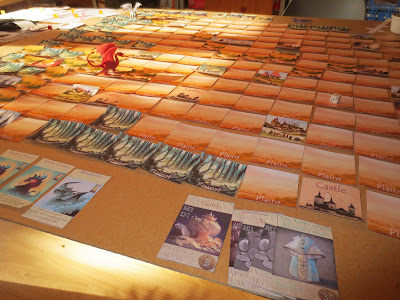I came across this 120-player game of D&D on LinkedIn. Unfortunately the post was whisked away from me before I could note the name of the valorous GM, so apologies for not crediting him here. It reminded me of when my friends Nick Henfrey (co-founder of Flat Earths) and Steve Foster (creator of Mortal Combat) and I turned up at our university D&D society just after Freshers' Week. Dozens of new members had signed up, so we found ourselves crammed into a tiny room (five metres square at the most) with a couple of dozen eager first-timers.
"You can't run a game for a party this size," I pointed out to the GM as we all put down figurines in the traditional ten-foot-wide corridor.
"Course we can," he insisted, announcing that the two people at the front could just make out an ochre jelly or whatever it was.
We played on for half an hour, with most people there watching in bafflement as the experienced players leading the party rolled lots and lots of dice. It didn't look like many of these newbies would be coming back next weekend. Nick whispered in my ear. "Let's liven things up."
We were in the middle of the party, so we started blasting spells and swinging swords in both directions, slaughtering folks on both sides until the experienced D&D players waded back and killed us. Outside in the corridor, one of the first-year players whose characters we'd killed asked, "So what are we going to do now?" I didn't know then, but he was Mark Smith.
I opened the next door. It was another meeting room even smaller than the first, maybe four metres square this one, but it was empty. "Have you ever heard of Empire of the Petal Throne?" I said. And that's where we started a game with the core of a group who went on campaigning together for a long time to come -- decades in some cases. There were several who went on to careers far removed from games (and hi there, Les, Sheldon and Pauline, if you happen to see this) but most notable among them was Mike Polling (yes, the author of "The Key of Tirandor") a friend and creative mentor with whom I did much of my early writing. Mike and Mark had been at school with Jamie Thomson. It was through Mike that I was introduced to Oliver Johnson -- they had met at a party the night before our weekly game, and Mike gave Oliver a drunken but apparently brilliant (neither of them can remember it now) account of how roleplaying worked. The next day Oliver showed up to see for himself. And so, directly or otherwise, that Sunday afternoon connected me to most of the RPG writers I'd be working with over the next forty-five years.Maybe life is full of those "Turn Left" moments. I met my wife because of another, but although that's obviously of paramount importance to me personally there's no gaming dimension so I won't recount the story here. What about you? Are there people or games that have changed your whole life which would have gone entirely unnoticed if you'd made just one different choice?










